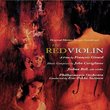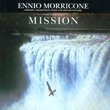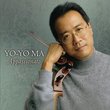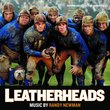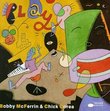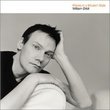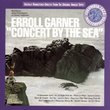| All Artists: Richard Danielpour, Leon Kirchner, Christopher Rouse, David Zinman, Yo-Yo Ma, Philadelphia Orchestra Title: Premieres Members Wishing: 0 Total Copies: 1 Label: Sony Release Date: 11/19/1996 Genre: Classical Styles: Chamber Music, Forms & Genres, Concertos, Historical Periods, Classical (c.1770-1830), Instruments, Strings Number of Discs: 1 SwapaCD Credits: 1 UPC: 074646629925 |
Search - Richard Danielpour, Leon Kirchner, Christopher Rouse :: Premieres
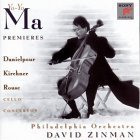 | Richard Danielpour, Leon Kirchner, Christopher Rouse Premieres Genre: Classical
The three works on this disc were all commissioned for Yo-Yo Ma. Listening to Leon Kirchner's Music for Cello and Orchestra put me in mind of Mahler. Indeed, had Mahler lived long enough to hear and be influenced by the Be... more » ![header=[] body=[This CD is available to be requested as disc only.]](/images/attributes/disc.png?v=cdde0dc6) ![header=[] body=[This CD is available to be requested with the disc and back insert.]](/images/attributes/disc_back.png?v=cdde0dc6) ![header=[] body=[This CD is available to be requested with the disc and front insert.]](/images/attributes/disc_front.png?v=cdde0dc6) ![header=[] body=[This CD is available to be requested with the disc, front and back inserts.]](/images/attributes/disc_front_back.png?v=cdde0dc6) |
Larger Image |
CD DetailsSynopsis
Amazon.com The three works on this disc were all commissioned for Yo-Yo Ma. Listening to Leon Kirchner's Music for Cello and Orchestra put me in mind of Mahler. Indeed, had Mahler lived long enough to hear and be influenced by the Berg Violin Concerto and decided thereupon to write a cello concerto for Feuermann, it might have sounded a bit like Kirchner's darkly passionate score. Both the Rouse and the Danielpour pieces are meditations on death, each lasting about half an hour. They are different in character but as compelling and vivid as the soloist for whom they were intended. Capturing these accounts was a heroic undertaking for Sony, the Philadelphia Orchestra, and all the participants--the takes were recorded during the blizzard of 1996, when two feet of snow blanketed the East Coast. The venue was the Giandomenico Studios in Collingswood, New Jersey, and the sound turned out to be first-rate. --Ted Libbey Similarly Requested CDs
|
CD ReviewsAbsurd! Classicalnovice | New York City | 03/20/2001 (1 out of 5 stars) "Although hardly a "classical novice" (I just happened to like the sound), anything but, I am, myself, partial to 20th century music; however, I cannot agree more with Mr. Sobel, below, in his estimation of these pieces, e.g. grating, unmusical and pretentious. I give Ma credit for attempting to establish them musically, but there's not much success that I can hear.As well, I hardly think it necessary for reviewer, S. Molman, also below, to resort to cheap musical backstabbing.I would take Korngold's music over this tripe ANYDAY of the week, and twice on Sunday. (Maybe not Goldmark, though.) Maybe S. Molman should follow his own directive and give Korngold a listen.Opinions expressed here are just that: opinions. No need to get personal." Hauntingly beautiful 09/17/1998 (5 out of 5 stars) "Ma plays with his usual passion and virtuosity and is matched by the Philadelphia Orchestra under Zinman's direction. These are dark, beautiful meditations on life and loss. Rouse's Violincello in particular builds to a shattering climax. Not pleasant background music, these pieces demand the listener's full attention. I had the good fortune to hear Ma perform Danielpour's piece at its premiere performances with the San Francisco Symphony. The recording captures all the energy and emotion of that thrilling experience." A Philadelphia Story Alton Thompson | Taipei, Taiwan | 05/24/2001 (5 out of 5 stars) "Good fortune allowed me to be one of those present in Philadelphia's Academy of Music on Saturday 6 January 1996. The program consisted of three new works performed by Yo-Yo Ma, David Zinman, and the Philadelphia Orchestra. The hall was packed-even though the repertory was unfamiliar to the audience, getting to the hall required a trek through sleet and bitter winds, and broadcasts had warned of the blizzard about to bury the city under record amounts of snow. Inside the hall we were warm.Sony Classical, in a release engineered by Richard King and recorded in Giandomenico Studios in New Jersey, makes the musical experience of that occasion available to all. The recording does remarkable justice to the rich tone of Yo-Yo Ma and to the depth and power of the Philadelphia Orchestra. In the liner notes, as in the programs for that evening's concert, Paul J. Horsley provides exceptionally informative commentary.Composers and weather demanded extraordinary efforts from the Philadelphia players and the musicians delivered. The percussion section in particular gets a far more demanding workout than what a run-of-the-mill cello concerto requires; Rouse even asks them to wield the big hammer they use for Mahler's Sixth. The players clearly relished this chance to show what they can do. Fortunately for the rest of us, the Sony engineers knew exactly how to mike and mix all this. The result is one of the finest recorded performances this orchestra has ever produced.The Danielpour and Rouse concertos are Romantic in idiom with a sure sense of the dramatic. Those familiar with the works of Schumann, Brahms, Mahler, Strauss, Shostakovich, and Barber will at once feel at home. Kirchner's piece is of more classical proportions even as its idiom stretches tonality further. All three works require an orchestra of huge proportions to present a kaleidoscopic range of textures, colors, and effects. Richard Danielpour's Concerto for Cello and Orchestra is performed as four connected sections. The sections, entitled "Invocation (Arioso)" "Profanation (Dance)" "Soliloquy (Cadenza)" and "Prayer and Lamentation (Hymn)", follow a sequence of events in a dream image. First, an oracle appears to a crowd and delivers bad news. Next, the listeners, infuriated, hurl accusations and pronounce a death sentence upon the oracle. A reflection on the tragedy follows and leads to the offering of a final hymn. In the music this hymn, sounded by four cellos, attempts to rise above the angry outbursts that continue in the orchestra. Danielpour's music throughout gives dramatic voice to conflicts that flare into the open and the opposing forces that contend with one another in turbulent episodes. The melodies possess a haunting vocal quality one does not soon forget. The main theme, for example, is an inflected descending line that simultaneously evokes a grace coming down, a tragic fall, and melancholy acceptance.Leon Kirchner's Music for Cello and Orchestra consists of a single movement lasting a little over fifteen minutes. Here the cello plays lyrical figures suggestive more of a serenade than an opera or symphony. The orchestra shifts through multi-hued harmonies and timbres in gestures of fluid, kaleidoscopic variety supported by solid structural logic.Christopher Rouse's Violoncello Concerto takes as its theme the human consciousness of mortality. This work is cast in two large movements. Each pits the songfulness and passion of soloist and orchestra against one other, and both against the chilling rattle of the percussion. Musical quotes of Claudio Monteverdi and William Schuman offer a poignant subtext. The piece ends as it must, with a phase that grabs you by the throat. Rouse, a native of Baltimore, quotes Edgar Allan Poe in the pages of his score: "Out--out are the lights--out all! / And over each quivering form, / The curtain, a funeral pall, / Comes down with the rush of a storm, / And the angels, all pallid and wan, / Uprising, unveiling, affirm / That the play is the tragedy 'Man,' / And its hero the Conqueror Worm." A long silence preceded the ovation in Philadelphia.This disk is a gem. If you love the cello, the orchestra, American music--for that metter, if you love life and your own place in history--don't hesitate. This experience belongs to you."
|

 Track Listings (7) - Disc #1
Track Listings (7) - Disc #1